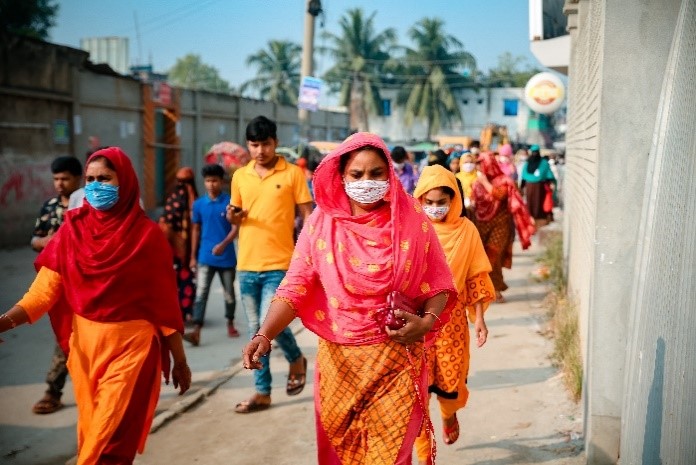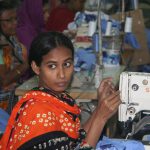
April 24th marks the grim anniversary of one of the world’s worst industrial disasters that killed at least 1,132 garment workers and injured more than 2,500 when the Rana Plaza building collapsed 8 years ago in Dhaka, Bangladesh.
In the years since, global initiatives, primarily the Bangladesh Accord on Fire and Building Safety, have achieved remarkable improvements to health and safety standards and practices in targeted Bangladesh factories. Much more needs to be done to ensure this progress stays on track and to keep improving the working conditions for the women who make our clothes. Safe factories, workers’ jobs, incomes and benefits remain at risk as the global pandemic continues to wreak havoc on global markets and economies. The people at the bottom rung of the supply chain should not have to bear the brunt of the crisis.
The Pandemic
Bangladesh is the world’s second-largest clothing exporter and during the COVID‑19 crisis, hundreds of factories closed as international and Canadian brands and retailers cancelled orders and refused to pay for orders already in production. Factories fired over a million workers and many refused to pay legally earned severance pay. Workers were left with no savings from subsistence‑level salaries and no access to social protection to support them in times of trouble. The forecast remains dire for garment sector workers as global demand for apparel items remains low.
It is of immense importance to build up social protection systems in Bangladesh and other garment-producing countries. Trade unions and labour rights organizations call for strengthened unemployment protection and the respect for all workers’ rights, including the right to organize. Retailers and brands must take responsibility for issues in their supply chains and contribute to a global wage assurance and severance guarantee fund to help workers survive the crisis.
Workers in Bangladesh have been courageously organizing and fighting for their rights for years but need the support of voices in purchasing countries such as Canada, in order to push Canadian brands to rebuild a just economy after the pandemic by establishing more sustainable and resilient supply chains that respect workers’ rights and ensure suppliers pay workers living wages and social benefits.
To learn more about the global campaign to pay workers: #PayYourWorkers
To learn more about the Bangladeshi garment sector workers’ working and living conditions supplying Canadian brands: usw.to/3q6
Extend the Bangladesh Accord for Health and Safety
The Accord on Fire and Building Safety in Bangladesh, a legally binding agreement between unions and brands and retailers created after the Rana Plaza collapse of 2013, led to real change in making death trap factories safe. Since its establishment, the Bangladesh Accord has provided safer working conditions for over 2 million garment workers by carrying out inspections and overseeing repairs and maintenance in more than 1,600 factories. The current agreement will end in late May and action is needed to safeguard progress in workplace safety.
There are great concerns about the functioning of the RMG Sustainability Council (RSC), the body that took over Bangladesh-based operations of the Bangladesh Accord. It is voluntary instead of being legally binding and workers hold less representation in its governing body. To prevent the RSC from becoming yet another industry-led voluntary initiative, the brands and retailers who signed the Accord before, including Loblaws (Joe Fresh), must make sure to lay their commitments down in writing again in a new international legally binding agreement. Now is the time for other Canadian brands, such as Lululemon Athletica, HBC, YM Group Inc, Arc’teryx and Canadian Tire, to also sign on to a new Accord. Brands and retailers must act now to protect progress and ensure an incident like Rana Plaza never happens again.
Mandatory Human Rights Due Diligence
A company’s responsibility flows through its entire corporate structure, including its business relationships and through its entire supply chain.
The Government of Canada must legislate companies to respect human rights in their global operations and supply chains. Such legislation should require companies to conduct due diligence on their human rights and environmental risks, take appropriate steps to prevent and mitigate such risks and hold companies accountable in the courts if they abuse human rights.
Action:
Support workers in Canadian supply chains by writing to Canadian companies Lululemon Athletica and YM Group to contribute to a Severance Guarantee Fund. Email and/or send a tweet to the CEO of Lululemon and the YM Group.
Endorsed by:
Canadian Labour Congress
Canadian Union of Public Employees
Centre international de solidarité ouvrière
Inter Pares
Maquila Solidarity Network
Ontario Secondary School Teachers’ Federation
Oxfam Canada
Public Service Alliance of Canada
United Steelworkers
Workers United Canada Council






